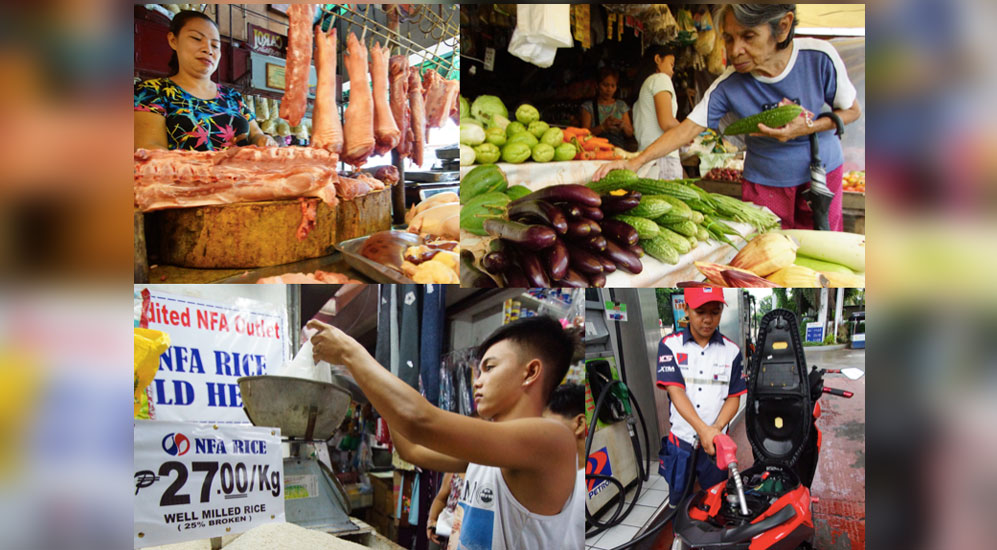Brace yourself as prices of basic commodities are expected to rise due to inflation.
This is the highest inflation rate so far 5.7 percent in five years, according to the government. Prices on food, gas, basic commodities and transport costs pushed inflation nationwide to 5.7 percent last month, the fastest rise in over five years, the government said on Tuesday. Thus, it reduces a family’s purchasing power.
The prices of basic goods and services rose from 5.8 to 6.5 percent in June and 2.9 percent in July last year. This is the fifth straight month that the rate has broken the central bank’s 2-4 percent target for this year. The inflation rate was near the top end of the central bank’s 5.1-5.8 percent estimate for July.
Amidst the rising consumer prices, the country’s economic managers assured the public that the government was moving to temper inflation. They said inflation would taper off toward the end of the year.
The Philippine Statistics Authority (PSA) attributed the increase in prices of basic goods and services to a 7.1-percent year-on-year increase in the price of food and nonalcoholic beverages.Rice prices have further gone up amid low grain inventory and depleted buffer stock of the National Food Authority.
Shortage on rice, meat and other goods
Just recently, Agriculture Secretary Emmanuel Piñol suggested in lowering of tariff and removal of non-tariff barriers to allow greater importation of fish, meat and wheat products as part of measures to temper rising inflation in the country. he justified that the prices of fish, poultry, vegetables and meat (pork and beef) products are continually increasing because of low domestic supply. Thus, the option to import is considered.
This is counter to the mandate of the Department of Agriculture which is to promote of agricultural and fisheries development and growth in the country.
Climate change, over-fishing and importation “quick-fix solution”?
Budget Secretary Benjamin Diokno admitted that the fisheries production in the country has substantially dropped through the years. Latest data from the PSA showed the fishery sector posted a 3.03 percent contraction in output in the January to March 2018 period from the 1.5 percent growth last year.
There are several factors that affect the rise of the prices of fish, poultry, vegetables and meat (pork and beef) products, because of low domestic supply.
The Bureau of Fisheries and Aquatic Resources (BFAR), commercial fishery saw a three percent decline in production to 216,200 metric tons following less fishing trips due to rough seas brought about by weather disturbances that prevailed in Western Visayas during the period.
Diokno said, climate change and over-fishing have also affected the country’s fish production despite being an archipelago surrounded by bodies of water.
Rise in the price of rice
“It is also expected that the prices of rice will increase due to supply problem in the country’s declining rice stock inventory caused by weather disturbances in the country”, Finance Secretary Carlos Dominguez III, Budget Secretary Benjamin Diokno and Socioeconomic Planning Secretary Ernesto Pernia said in a joint statement.
The 2.36 million metric tons of rice last month “declined by 8.2 percent year-on-year (from 2.57 million metric tons in July 2017 and dropping by 18.8 percent from the preceding month’s 2.91 million metric tons), with the National Food Authority’s rice buffer remaining almost depleted.”
Fare Hike
As inevitable, the driver of inflation is higher transport costs. Since July 9, the minimum jeepney fare has been increased to P9 from P8 because of rising pump prices of fuel. Even the price of the cigarettes have increased from P30 last year, to 32.50 in January and now P35 per pack due to the Tax Reform for Acceleration and Inclusion (TRAIN) Act.
The TRAIN law, which was implemented on Jan. 1, imposed new excise on cigarettes, sugary drinks, oil products and vehicles to compensate for a higher tax-exempt personal income.
Because of this, workers saw their income has gone down by as much as P2,700 in the first six months and roughly 60 million Filipinos suffered an income loss of around P993 to P2,715 because of the higher-than-expected inflation.
The research group, Ibon Foundation noted that the peso’s continued depreciation, the rising price of oil on the global market and the implementation of the TRAIN law were among the factors that drove up inflation to 5.7 percent in July.
Wage adjustment
Labor groups said that Ibon’s estimate showed that the recent P9 to P56 increase in the minimum wage imposed by the Department of Labor and Employment was not enough to cover at least P165 that workers lost to inflation monthly.
Rene Magtubo of Nagkaisa labor coalitionurged the government to fast-track its plan to fill the market with basic goods, such as rice, sugar, cooking oil at affordable prices to tame inflation. While the Federation of Free Workers urged the Department of Trade and Industry to be more proactive in monitoring businesses, which may take advantage of the situation.
Other labor and cause-oriented group urge the Duterte administration and cabinet heads to come up with a long term solution and not quick-fix solution.














